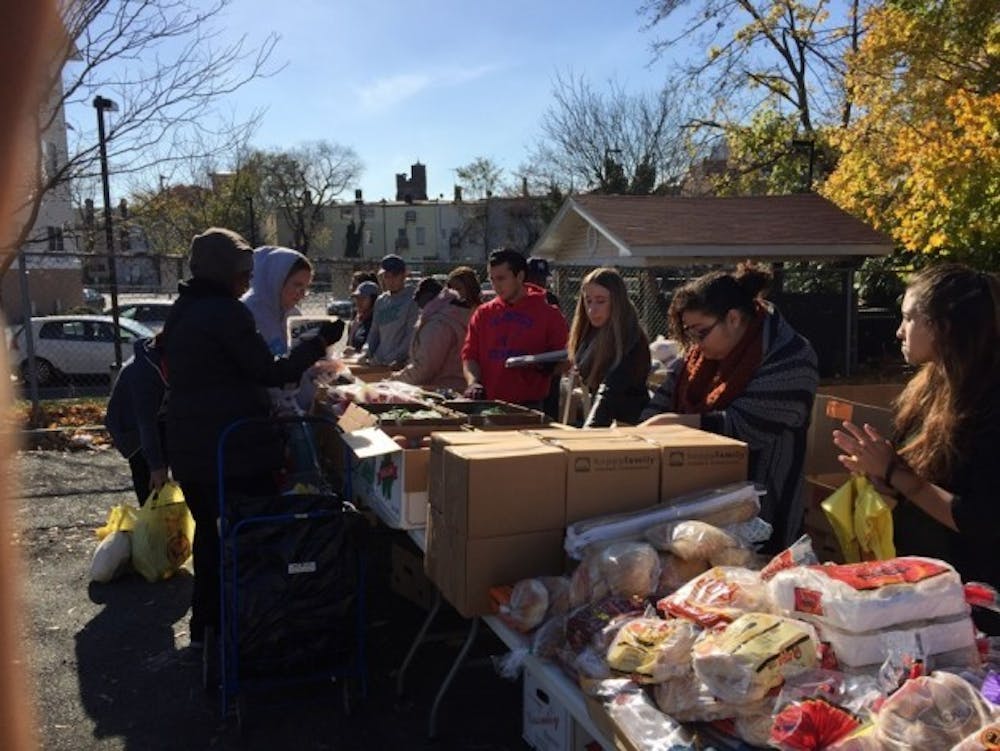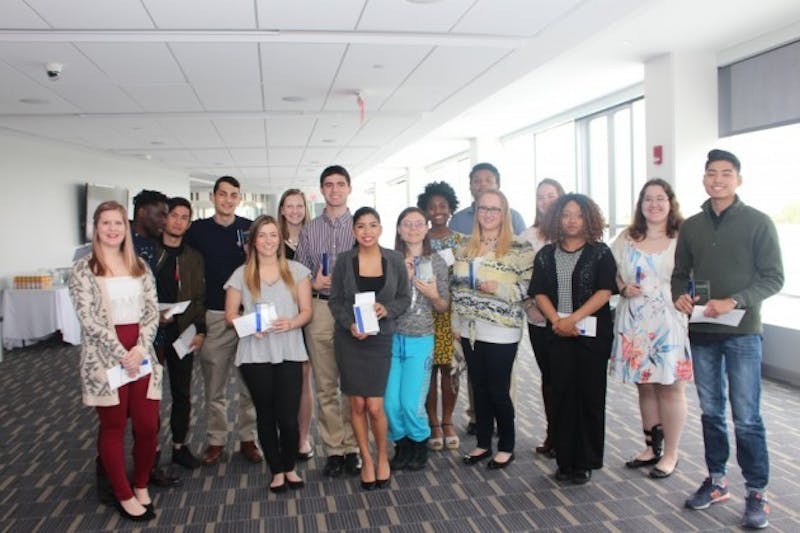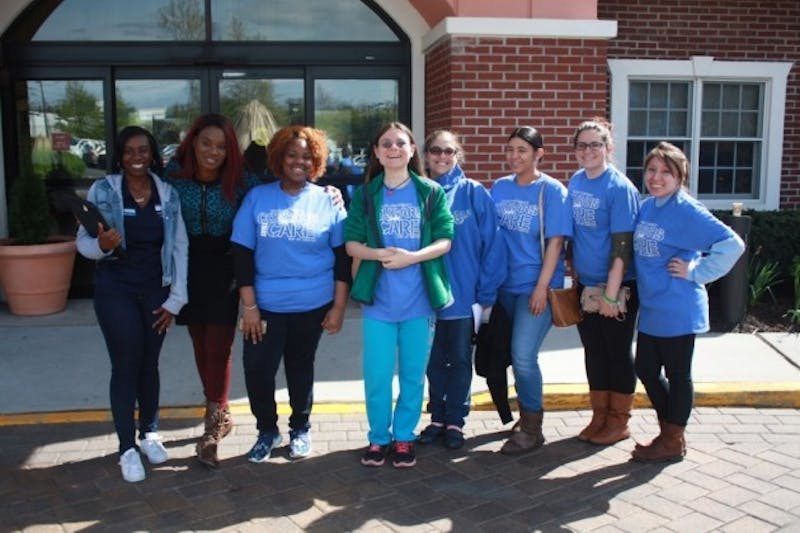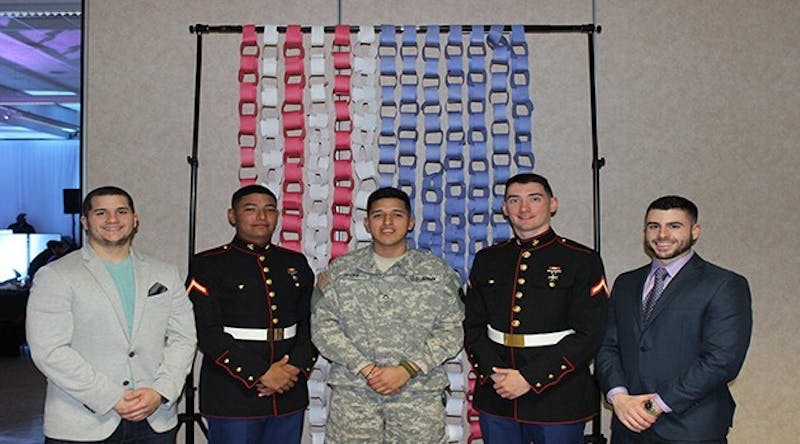Students participating in one of the activities for Hunger and Homelessness week
Uriel Solis l The Cougar’s Byte
November is Hunger and Homelessness Awareness Month. Annually, Kean University dedicates a week to ensure that the community acknowledges this month dedicated to two of the most widespread misfortunes that plague the world daily.
From November 14 to 21, the Kean community contributed its time, energy, donations and labor through Hunger & Homelessness Awareness Week. Through their dedication, students committed themselves to those without food or shelter. These various events were intended to inform, educate and spread awareness surrounding issues of hunger, homelessness, food insecurity and poverty.
Antonio Amorim, senior communications major, “I believe it [hunger and homelessness week] is important because many homeless have just fallen on hard times and any way college students can help, we should…” The week of awareness took place as follows:
- From Friday, November 13 to Friday, November 27, Kean University will be supporting the homeless through a clothing charity. Thrift Nation is an organization dedicated to improving social conditions by providing quality clothing to the homeless or those in shelters. They initiated the campaign where boxes are placed throughout campus for individuals to donate clothes and non-perishable foods. These donations help those in need by ensuring that they have the things they might otherwise not have access to.
- On Saturday, November 14, students had the opportunity to participate in the Community FoodBank of New Jersey (CFNJ). Volunteers who choose the food bank as their medium of support can help in numerous ways. They can either spend their time sorting and repacking food for distribution, assembling outfits for children in the kids division, preparing the mass mail to help spread the word about hunger or even collecting food at community food drives such as turkeys for holiday. In whatever task they do, they make a tremendous difference in the life of a stranger. This cause was revisited on the Friday, November 20.
- A few days following, on Monday, November 16, the university hosted the Stand Campaign. Students stood in support along Cougar Walk with flyers and posters to raise awareness about global homelessness. While seemingly trivial, demonstrations like this have the capacity to significantly speak to the general population. Many people are not aware of how truly pervasive these unfortunate circumstances are. Through statistics, quotes and advocating words, students are magnifying these issues to a world that is sadly, often desensitized.
- Succeeding that the campaign, on Tuesday, November 17 volunteers went to the New Jersey’s Pediatric Mobile Food Pantry (NJPMFP). This is a subdivision of the Community FoodBank of New Jersey wherein food is distributed to the local women in the community who are clients of the women’s clinic of one of three hospitals: Beth Israel Hospital, Trinitas Hospital or St. Joseph’s Regional Medical Center. Volunteers organized and distributed an array of food for the families who waited in a substantially long line, goods that these families would otherwise go without.
- On the 18 of November, volunteers used their time to make sandwiches for those who may not have a guaranteed meal for the day. All completed sandwiches were delivered to Saint John's Food Pantry in Elizabeth, New Jersey. From there, volunteers work copiously to distribute the food on a daily basis to the local homeless and working poor. Students not only donated their time but also loaves of bread and other supplies, which frequently run out considerably quickly. A simple sandwich means the world to someone who is uncertain of where their next meal might come from.
- On Thursday, November 19, Kean University hosted its second annual Hunger Simulation. In it, students draw identities from a pot in which they will portray that person throughout the entirety of the simulation. This random identify could be affected by hunger and or homelessness. Students are enlightened as to the many directions that someone’s life can easily go once they are faced with such drastic hardship. Through this, students are exposed to the harsh reality that many people face daily and they experience what it is like to be poverty stricken.
- The ending of the official Hunger & Homelessness Awareness Week at Kean University was on Saturday, November 21. Students collaborated with Habitat for Humanity to work towards building a home. The organization’s cause has built and rehabilitated more than 400,000 houses. This staggering figure only reflects the reality that the need is ever-present. Through its work with them, Kean University is not only being proactive in their efforts, but is also giving back to the surrounding community.
The Kean community has made it a priority to be an atmosphere of giving back, social responsibility and community advancement. Many of the causes work towards improving not only the students but their communities as well. As an environment of growth and learning, it’s critical to develop students who are empathetic to their surrounding communities. Kean University believes it is its educational duty to encourage students to understand poverty and hunger on a global scale and try to make a change.
Amorim explains the various ways students can take it upon themselves to help. He states, “…Community outreach, soup kitchens, food pantry. Any type of support within the community would help tremendously.” Each of these causes is helping someone transition into a better point in their lives.
In September 2015, there were 59,305 homeless people and approximately 795 million people in the world were chronically malnourished. These striking statistics illustrate the degree to which the world is pervaded with these issues. For those unaffected by these massive problems, the statistics are the one thing that makes these circumstances palpable. Former writer and political activist Eldridge Cleaver was once quoted as saying, “There is no more neutrality in the world. You either have to be part of the solution, or you're going to be part of the problem.” When people take a stance of indifference, believing their inaction it to be inconsequential, they have more or less chosen to condone the problem.
So while it is one thing to understand, it is another thing entirely to empathize. When people can begin to empathize with someone whose context is dramatically different from theirs, they can begin to genuinely support them and develop a vested interest in their well-being.
Amorim states, ““I’m currently taking community mental health with Dr. Bowe and she has taken us to feed the homeless at Penn station and it was heartbreaking to see how much help these people really needed.”
There is no part of the world that is untouched by these painful circumstances. These problems extend far beyond their obvious reaches; they affect education when children are too hungry to focus on school and they affect disease when homeless people do not have access to readily available healthcare. When basic amenities are not satisfied, life is minimized. Kean University dedicates all of its resources toward ensuring that no one lives a life that is anything short of fruitful and fulfilling.
For more information, please visit the CLS in Miron Student Center (MSC) room 219 or call 908-737-5170.






